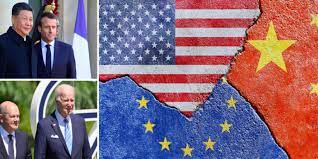The geopolitical balances between Europe and the US have been shifting in recent years. The US has traditionally been the dominant power in the West, but its influence has waned in recent years due to a number of factors, including the wars in Iraq and Afghanistan, the financial crisis of 2008, and the rise of China.
Europe, on the other hand, has been growing in economic and political power. The European Union has become a major economic bloc, and its member states have been playing a more active role in international affairs. For example, the EU has been a leading force in the fight against climate change and in the promotion of democracy and human rights.

The shifting balance of power between Europe and the US has led to some tensions between the two sides. For example, the US has been critical of the EU's handling of the migration crisis, and the EU has been critical of the US's withdrawal from the Paris Agreement on climate change.
However, there are also a number of areas where Europe and the US still cooperate closely. For example, the two sides work together on security issues, such as the fight against terrorism and the promotion of stability in the Middle East. They also cooperate on economic issues, such as trade and investment.
The future of the geopolitical balances between Europe and the US is uncertain. It is possible that the two sides will continue to cooperate closely, or it is possible that they will drift apart. The outcome will depend on a number of factors, including the rise of China, the outcome of the war in Ukraine, and the policies of the US and European leaders.
Here are some of the key factors that are likely to shape the future of the geopolitical balances between Europe and the US:
- The rise of China: China is the world's second largest economy, and it is rapidly becoming a major military power. The rise of China is likely to challenge the US's position as the dominant power in the West.
- The outcome of the war in Ukraine: The war in Ukraine has shown the importance of European security cooperation. If the war drags on, it could lead to a more united and assertive Europe.
- The policies of the US and European leaders: The policies of the US and European leaders will have a major impact on the future of the geopolitical balances between the two sides. If the leaders are willing to cooperate, they can strengthen the transatlantic alliance. However, if they are not, the alliance could weaken.
Ultimately, the future of the geopolitical balances between Europe and the US is uncertain. However, it is clear that the two sides will continue to be major players on the world stage. The way in which they cooperate or compete will have a major impact on the future of the world.